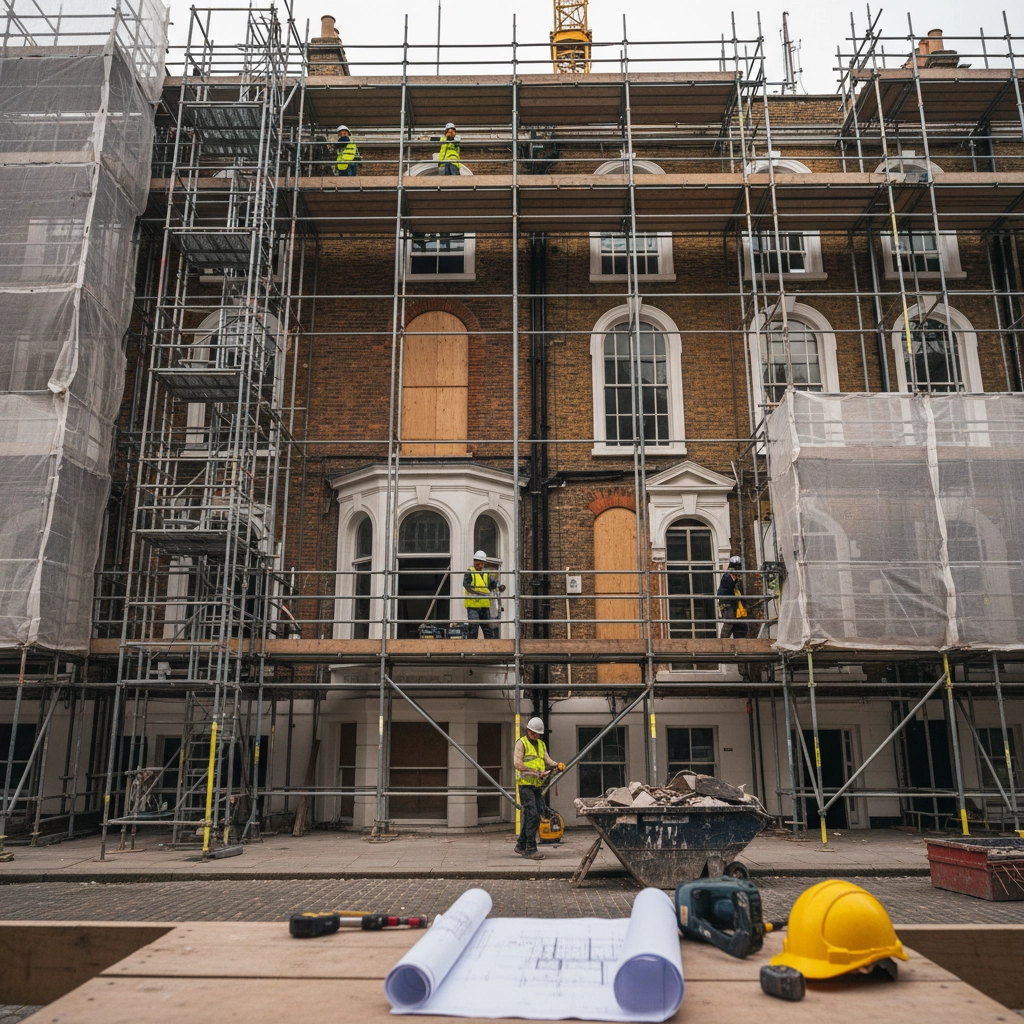Having deep pockets at a London property auction might seem like an automatic advantage, but you’d be surprised how many cash-rich investors walk away with expensive mistakes instead of profitable deals. After years of watching wealthy buyers stumble through the auction process, I’ve noticed the same costly errors cropping up again and again.
The truth is, having money doesn’t make you immune to auction pitfalls – it often makes you a bigger target for them. Here are the seven most common mistakes I see cash-rich investors making, and more importantly, how to avoid them.
Mistake #1: Skipping Due Diligence Because “I Can Afford Any Problems”
This is the big one. I’ve watched investors with seven-figure budgets bid on properties they’ve never even stepped inside, thinking their cash reserves can handle whatever surprises await. It’s a dangerous game.
Just last month, a wealthy international buyer won a Victorian conversion in Clapham without viewing it first. Turns out, the property had non-standard steel beam construction that made it practically unmortgageable. Even with cash, finding tenants or eventually selling became a nightmare. The investor ended up losing over £40,000 in forfeited deposits and legal fees.
Property auctions attract problem properties – that’s often why they’re at auction in the first place. Your financial strength should enable better due diligence, not replace it.
The Fix: Always view the property, hire qualified surveyors, and research its history thoroughly. Use your cash advantage to conduct more comprehensive due diligence than your competitors, not less.

Mistake #2: Ignoring Legal Pack Reviews
Cash buyers often assume they can skip the legal pack review because they’re not dealing with mortgage lender requirements. This is a costly misconception that I see particularly with overseas investors who aren’t familiar with UK property law.
The legal pack contains crucial information about title issues, planning permissions, lease terms, and potential liabilities. I’ve seen investors acquire properties with restrictive covenants, ongoing disputes with neighbours, or buildings that don’t match their planning permissions.
The Fix: Have a qualified solicitor review the legal pack before you bid. Factor this cost into your budget – it’s insignificant compared to the potential losses from legal complications. At Palace Auctions, we always recommend getting legal advice even for cash purchases.
Mistake #3: Getting Caught Up in Auction Fever
The competitive atmosphere of a London property auction can be intoxicating, especially when you know you can afford to keep bidding while others drop out. I’ve watched cash-rich investors get so caught up in “winning” that they forget they’re supposed to be making a sound investment.
Auctions are designed to extract maximum value from buyers. The rapid-fire bidding, the packed room, the auctioneer’s encouragement – it all works on your psychology. Having deep pockets can actually make this worse because you don’t have natural stopping points like mortgage limits.
The Fix: Set your maximum bid before entering the room and treat walking away as a victory when bidding exceeds your limit. I always tell my clients: if your max is £800,000, both winning at £750,000 and walking away at £850,000 are successful outcomes.
Mistake #4: Underestimating Refurbishment Costs and Timelines
“I’ll just throw money at it” is not a renovation strategy, yet many cash-rich investors approach auction properties with exactly this mindset. They see a property with potential, factor in a rough renovation budget, and assume money can solve any problem quickly.
London’s planning restrictions, conservation area requirements, and building regulations can turn a “simple” refurbishment into a years-long saga. I’ve seen investors buy Georgian terraces thinking they’d have them back on the market in six months, only to discover they needed planning permission for basic alterations.
The Fix: Get detailed quotes from qualified contractors before bidding, understand planning requirements for your intended use, and double your timeline estimates. Cash might speed up the work, but it won’t eliminate bureaucratic delays.

Mistake #5: Overlooking Ongoing Costs and Cash Flow
Having enough cash to buy doesn’t mean you have enough cash to hold. Many wealthy investors focus entirely on acquisition costs and forget about the ongoing expenses of owning London property, especially when dealing with leasehold properties or buildings requiring extensive maintenance.
Service charges on luxury developments can run into thousands monthly. Ground rent, insurance, management fees, and maintenance costs all add up. If your plan involves holding the property while working through planning applications or major refurbishments, these costs can quickly spiral.
The Fix: Calculate holding costs for your entire ownership period, not just the purchase price. Include service charges, insurance, security, utilities, and potential void periods. Make sure you have adequate cash reserves beyond the purchase price.
Mistake #6: Misunderstanding London’s Rental Market
Cash investors often assume expensive properties automatically generate proportional rental income. In London, this relationship isn’t linear. A £2 million property doesn’t necessarily yield twice the rent of a £1 million property, and prime locations can have surprisingly specific tenant requirements.
I’ve seen investors buy stunning penthouses in prestigious postcodes, only to discover that corporate tenants (their target market) preferred more practical layouts in different areas. The rental yields ended up disappointing despite the significant investment.
The Fix: Research rental markets extensively before bidding. Understand your target tenant demographic, typical rental yields in the area, and seasonal demand patterns. Consider hiring a local letting agent for market insights before you buy, not after.

Mistake #7: Ignoring Exit Strategy Planning
Cash-rich investors sometimes buy auction properties without clear exit strategies, assuming they can always sell profitably later. While this might work in consistently rising markets, London property can be more nuanced, with different areas and property types experiencing varying levels of demand.
Unique properties, ex-local authority conversions, or properties with unusual lease terms might have limited buyer appeal when you come to sell. What seemed like a good deal at auction might be difficult to move on later.
The Fix: Before bidding, research recent sales of similar properties in the area. Understand who typically buys these types of properties and whether there’s sufficient market depth. Consider your likely exit timeline and any factors that might affect marketability.
Making Your Cash Work Smarter
The key message here isn’t that cash is a disadvantage – quite the opposite. Cash buyers have significant advantages at London property auctions: speed of transaction, certainty of purchase, and negotiating power. The mistake is thinking these advantages eliminate the need for proper preparation and strategy.
Your financial strength should enhance your due diligence capabilities, not replace them. Use your resources to hire better advisors, conduct more thorough research, and maintain discipline in your bidding strategy.
At Palace Auctions, we work with many cash-rich investors who have learned to combine their financial advantages with smart auction strategy. The most successful ones treat their cash as a tool for making better decisions, not as insurance against making poor ones.
The London property auction market rewards preparation, patience, and discipline – regardless of how much money you have to spend. Make sure you’re using your financial strength to buy better properties, not just more expensive mistakes.
……


